|
Play List: 4. Corinne 7. The Mormons 9. Lucy Brandon 10. Storm-Beaten 11. Lady Clare 13. Bachelors 14. Constance 15. Lottie 16. Agnes 17. Alone in London 18. Sophia 19. Fascination 20. The Blue Bells of Scotland 21. Partners 24. Angelina! 25. The Old Home 26. A Man’s Shadow 27. Theodora 29. Clarissa 30. Miss Tomboy 32. Sweet Nancy 33. The English Rose 36. Marmion 37. The Gifted Lady 38. The Trumpet Call 39. Squire Kate 40. The White Rose 42. The Black Domino 44. The Charlatan 45. Dick Sheridan 47. Lady Gladys 48. The Strange Adventures of Miss Brown 49. The Romance of the Shopwalker 52. Two Little Maids from School ___ |
|
ROBERT WILLIAMS BUCHANAN (1841 - 1901) |
|
|
|
|
|
|
|
|
3. When Knights Were Bold - Reviews, etc. (2)
The New York Times (21 August, 1907) ENGLISH FARCE FINDS FAVOR AT GARRICK Francis Wilson Highly Amusing as Sir Guy de Vere ANOTHER DREAM PLAY Piece Which Has Had Long London Run is Enthusiastically Received Sir Guy de Vere . . . . . . . . . . . . . . . Francis Wilson Two people in the Garrick audience snickered last night when the amiable Mr. Widdecombe in “When Knights were Bold” sprung his idiotic riddle about Noah. ___
The Sun (New York) (21 August, 1907 - p.5) MR. WILSON’S NEW FARCE “WHEN KNIGHTS WERE BOLD” Star Goes to Sleep to Dream of Life in the Francis Wilson appeared at the Garrick Theatre last night as the chief personage in a farce by Charles Marlow entitled “When Knights Were Bold.” The record may begin with the statement that the play, slight and fanciful as it proved to be, pleased the audience, and with good reason, for it was a commendable bit of foolery. The ancient and honorable objection that it contained nothing new is easily raised against it, but as a rule the theatregoing public is amused by the things which amused its forefathers, and that is a fact upon which managers build fond hopes. |
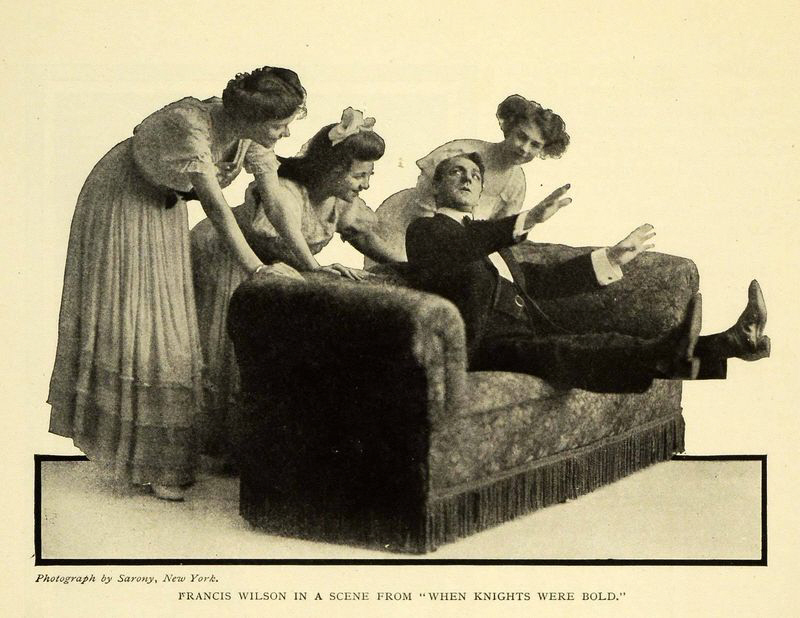 |
|
The Constitution (Atlanta, Georgia) (21 August, 1907) NEW DRAMATIC YEAR The opening of the new dramatic year in the New York theaters is the subject of the following in The Sunday World: . . . “When Francis Wilson begins his third season as one of Charles Frohman’s stars at the Garrick theater on Tuesday evening in ‘When Knights Were Bold’ it will be found that much of the ground has already been cut from under this new farce by ‘The Road to Yesterday,’ produced a year ago. ___
Lloyd’s Weekly News (25 August, 1907 - p.9) In view of the eccentricities of the weather many are hastening homewards earlier than usual. There is, in fact, a general sense of returning to duty just now particularly noticeable theatrically. Mr. Edmund Payne has come back quite quickly to be the leading spirit in “The Girls of Gottenberg.” That unsurpassably serious comedian, Mr. James Welch—his terror is the funniest thing ever seen—is back also at Wyndham’s to do justice to “When Knights were Bold,” and on Monday Mr. Gerald du Maurier reappears in “Brewster’s Millions,” which then has a new habitation at the Duke of York’s theatre in place of the Hicks. To mark this change appropriately a new one-act play, entitled “A Little Japanese Girl,” adapted from the Japanese by Miss Loie Fuller, the dancer, will be put on. ___
The New York Dramatic Mirror (31 August, 1907 - p.3) REVIEWS OF NEW PLAYS. FARCE, MUSICAL COMEDY, AND TWO Francis Wilson Has a Capital Opportunity— ... Criterion—When Knights Were Bold. Farce, in three acts, by Charles Marlow. Produced Aug. 20. (Charles Frohman, manager.) Sir Guy de Vere . . . . . . . . . . . . . . . Francis Wilson When Knights Were Bold inevitably suggests the induction to The Taming of the Shrew and The Road to Yesterday. This is said with no suggestion of plagiarism, for the Marlow play can stand squarely on the legs of its own originality. Whatever it may call to mind at points, the general impression which it leaves is of itself alone. It has been long since so jolly a farce has been seen upon the American stage. By the same token, not since the days of Erminie—if then—has Francis Wilson appeared to such advantage. ___
The Cheltenham Looker-On (14 September, 1907 - p.13) The Opera House. “WHEN KNIGHTS WERE BOLD.” A good play and a company of clever artistes surely should serve to draw crowded audiences to the Opera House this week, and we can most assuredly advise those who care for farcical drama and enjoy a hearty laugh to view the performance of “When Knights were Bold,” either this afternoon or evening. |
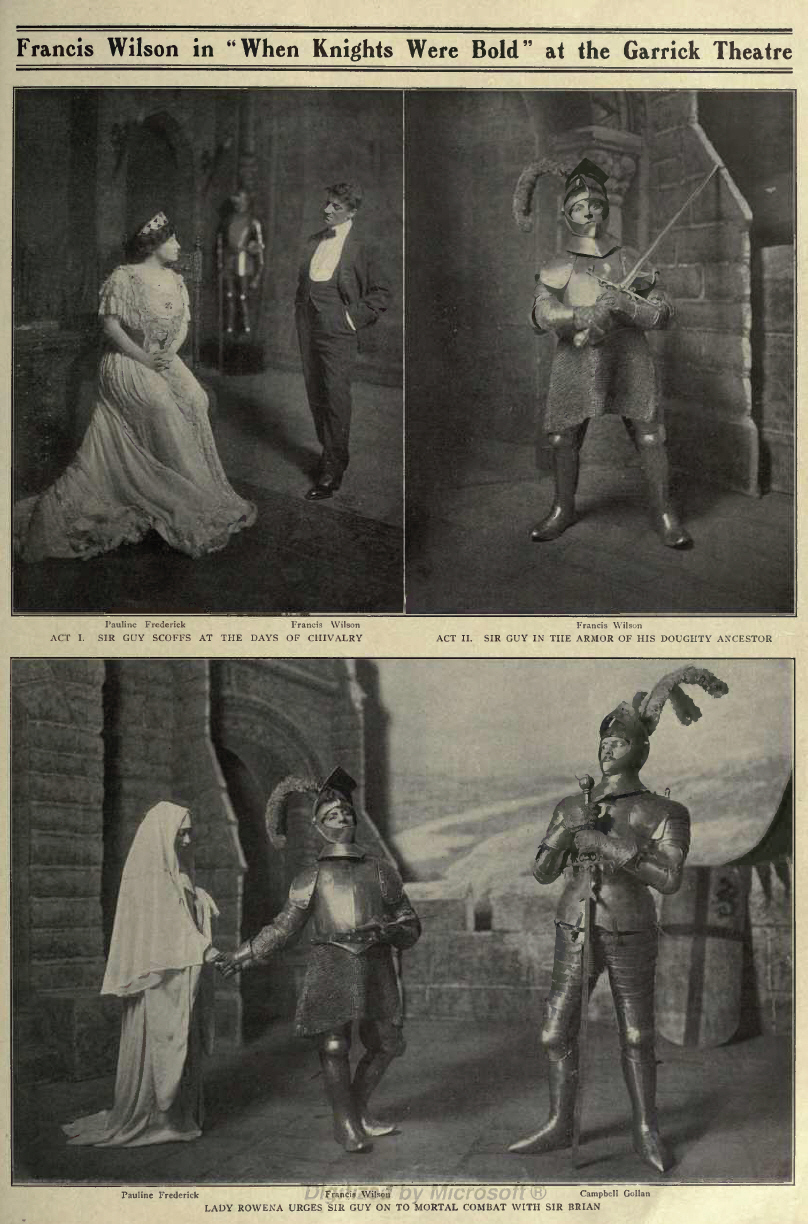 |
|
[From The Theatre Magazine (October, 1907, Vol. VII, No. 80, p. 275).]
The Theatre Magazine (October, 1907, Vol. VII, No. 80, p. xvii.) GARRICK. “WHEN KNIGHTS WERE BOLD.” Farce in three acts by Charles Marlow. Produced August 20 with this cast: Sir Guy de Vere, Francis Wilson; Isaac Isaacson, George Irving; Hon. Charles Widdecombe, Augustin Duncan; Rev. Peter Pottleberry, D.D., Clarence Handysides; Sir Brian Ballymote, Campbell Gollan; Wittle, Victor Benoit; Barker, Joseph Allen; Lady Rowena Eggington, Pauline Frederick; Lady Millicent Egginton, Edna Bruns; Lady Marjorie Eggington, Ruth Barry; Miss Isaacson, Margaret Gordon; Kate Pottleberry, Adelaide Wilson; Hon. Mrs. Waldegrave, Florence Edney; Alice Barker, Elsa Garret. No matter what his vehicle may be, Francis Wilson is always irresistibly funny. This comedian’s gift for provoking honest laughter would make the fortune of any manager and playwright. From this viewpoint his value is incalculable, for people don’t have to worry about the merits or demerits of the play. They go to see Wilson—that’s all. “When Knights Were Bold” does not afford the actor as good opportunities for clever fooling as other pieces he has appeared in, but it answers the purpose. Reminiscent in its idea and treatment of one of last season’s successes, “The Road to Yesterday,” it is full of the tricks and comic situations that Mr. Wilson knows how to play to perfection. Sir Guy de Vere, an up-to- date little English bounder whose tastes run to card-playing and horse-racing rather than to admiring the chivalrous exploits of his doughty ancestors, is pestered by his friends, who are constantly dinning into his ears his family’s proud past. Sir Guy does not care a rap about his ancestors, and his lack of family pride disgusts Lady Rowena, a romantically inclined young woman who is betrothed to him. Incidentally, Lady Rowena is run after for her money by Sir Brian Ballymote, a titled adventurer. Sir Guy gets his feet wet and is put to bed, when he dreams he is actually living in the Middle Ages. The prototypes of the people he knew in modern life all appear and no end of droll complications arise out of this fanciful idea. Lady Rowena, a bloodthirsty maiden, urges him to fight a mortal duel with Sir Brian, and this combat in armor is one of the funniest scenes in the piece, which is played with spirit throughout and furnishes capital entertainment. ___
The Daily Telegraph (17 October, 1907 - p.6) We look to the modern player quickly to “put a girdle round the earth.” Mr. Frank Thornton sails to-morrow week for Australia, and expects between Christmas and the summer of 1909 to have travelled a cheery distance of about 16,000 miles in the land of the kangaroo. As he has performed this trifling feat on five previous occasions, it is not surprising that he and his company—a round dozen all told—look forward to the trip with feelings of delight. Australia is very loyal to old friends and old favourites, and the comedian who gave us so much pleasure both at the Savoy and the Gaiety captured its heart many years ago, as he well deserved to do. Mr. Thornton takes out “When Knights Were Bold,” fully equipped—it needs a good deal of equipment—and will, of course, play in that uproarious farce the character in which Mr. James Welch has gained such success. A special “send off” dinner is to be given the voyager by the Savage Club on Saturday evening. ___
Daily Mail (30 October, 1907) Court and Society. The Queen, the Queen of Norway, the Princess of Wales, and Princess Victoria paid a visit to Wyndham’s Theatre last night to witness “When Knights Were Bold,” in which Mr. James Welch presents such a laughable figure. The royal party, who occupied two boxes, arrived soon after nine o’clock. Prince Francis of Teck sat with his sister and the Queen in the box next to the stage. All the royal ladies were in black and white except the Queen of Norway, who wore a lovely dress of pink and black gauze with a sparkling wreath in her hair. Queen Alexandra had a jetted dog-collar and great solitaire diamond ear-rings. |
||||||||||||||||||||||||||||||||||||
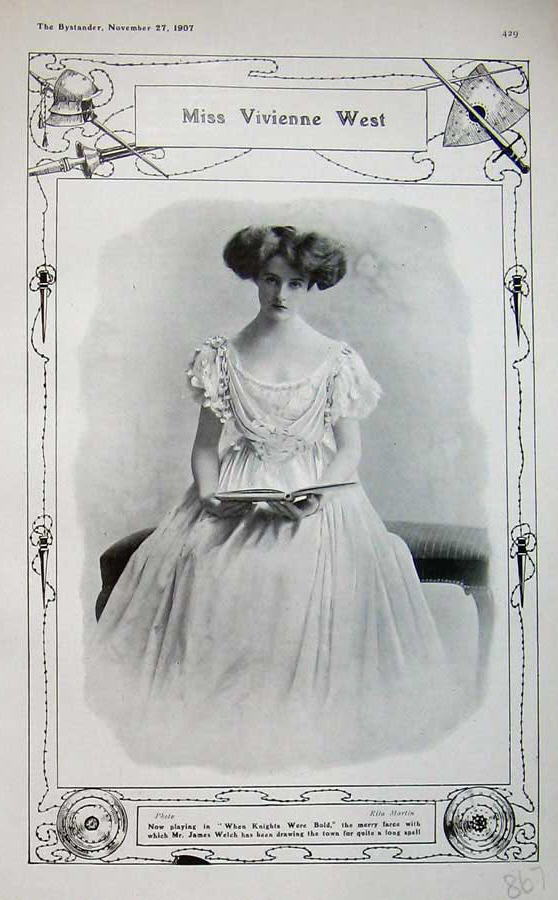 |
||||||||||||||||||||||||||||||||||||
|
[Miss Vivienne West in When Knights Were Bold from The Bystander (27 November, 1907).]
The Stage (21 November, 1907 - p.18) WYNDHAM’S. Having most successfully kept its place in the bill at Wyndham’s since its London production there on January 29, Harriett Jay’s mirth-provoking and emphatically ludicrous “Ivanhoe” travesty, When Knights Were Bold, triumphantly reached its 300th performance on Thursday, November 14, when once more a crowded and well satisfied audience laughed unrestrainedly at the comical work of Mr. James Welch, capitally supported by Miss Audrey Ford, Mr. Charles Weir, Mr. Henry J. Ford, Miss Helen Palgrave, and the rest. Mr. Welch, having obviously a free hand, makes a funnier figure than ever of that “heir of the ages,” Sir Guy De Vere. The bewilderment of that essentially modern and commonplace aristocrat, when, in Dreamland, transported back 710 years, he finds himself confronted with unfamiliar manners, dress, speech, and so on, is shown in fine contrast to the chivalrous spirit inherited by Sir Guy from his ancestors, whose valour is extolled by Lady Rowena in mock-heroic passages, declaimed in admirable fashion by Miss Audrey Ford. Excellent work is still done by Mr. H. J. Ford, a most amusing Widdicombe; Mr. Arthur Grenville, a plausible Isaacson; Mr. Weir, an effectively blustering Sir Brian; Miss Daisy Cordell, a winsome Sarah; Messrs. Guy Lane, G. F. Tully, & Gordon Tomkins; Miss Palgrave, a stately Mrs. Waldegrave; and the other members of Mr. Welch’s company’ The first piece at Wyndham’s is still W. W. Jacobs and Herbert C. Sargent’s effective little piece The Boatswain’s Mate, produced on April 15. In this Miss Tasco Page has replaced Miss Ethel Hollingshead as Mrs. Waters, the attractive young widowed landlady of “The Beehive,” Mr. W. E. Richardson and Mr. Tully re-appearing with the former success as the ex-boatswain and ex-soldier. |
||||||||||||||||||||||||||||||||||||
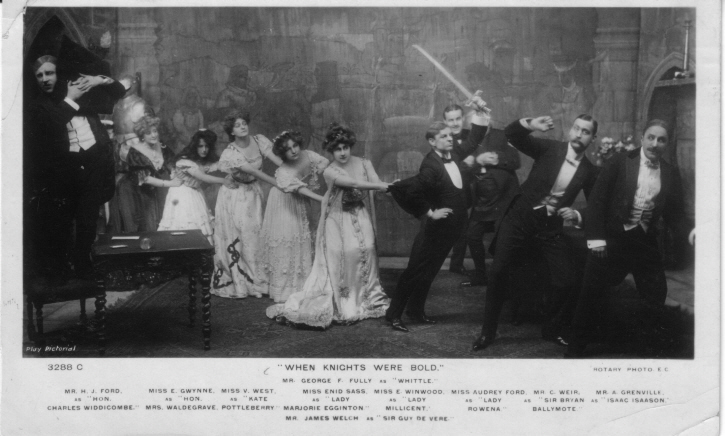 |
||||||||||||||||||||||||||||||||||||
|
[A postcard (posted on November 22nd, 1907) featuring a scene from When Knights Were Bold.
The Evening Post (Wellington, New Zealand) (7 December, 1907 - p.15) Mr. Frank Thornton with a company of twelve artists engaged in England has arrived in Australia. This favourite comedian will tour Australia under the direction of Mr. Edwin Geach for 44 weeks, visiting every State except Queensland. His principal attraction will be the new farcical comedy, “When Knights were Bold,” just now the reigning farcical success in Londan and New York. The London Daily Telegraph gives Mr. Thornton a very cordial send-off paragraph in “Drama of the Day,” remarking that the modern player is expected quickly to “put a girdle round the earth,” and that during next year the traveller hopes to cover a distance of about 16,000 miles in the land of the kangaroo—a feat he has performed on five previous occasions. “Australia is very loyal to old friends and old favourites, and the comedian who gave us so much pleasure both at the Savoy and the Gaiety, captured its heart many years ago, as he well deserved to do. Mr. Thornton takes out “When Knights Were Bold,” fully equipped—it needs a good deal of equipment—and will, of course, play in that uproarious farce the character in which Mr. James Welch has gained such success. A special ‘send off’ dinner is to be given the voyager by the Savage Club on Saturday evening.” Mr. Thornton opens at the Sydney Criterion on 21st December. ___
The Sydney Morning Herald (23 December, 1907 - p.3) “WHEN KNIGHTS WERE BOLD.” After an absence from Sydney of about four years Mr. Frank Thornton opened a season at the Criterion Theatre on Saturday evening with his new London Comedy Company, in Charles Marlowe’s farcical comedy “When Knights Were Bold.” There was an excellent house, and if first impressions may be relied upon the piece should have a prosperous run. The dialogue is bright and diverting, and though the first act drags somewhat, ample food for laughter is subsequently provided. In fact many of the incidents provoked roars of merriment, and it is probable that Mr. Thornton has submitted nothing funnier here since the time when “Charley’s Aunt” was staged. “When Knights were Bold” is just about as extravagant; but its very absurdity effects the object aimed at, which is to lift the audience out of the worries of strenuous business, and enable them to revel for a time in an atmosphere where fun and frivolity reign supreme. Mr. Thornton and the leading members of his company were received with the usual cordiality, and the ____ gift to the ladies of handsome flowers after the last act was no doubt intended as a substantial indication of appreciation. |
||||||||||||||||||||||||||||||||||||
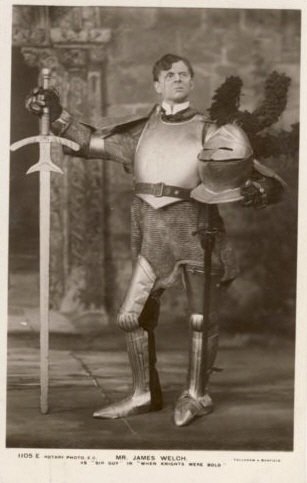 |
||||||||||||||||||||||||||||||||||||
|
Daily Express (12 February, 1908 - p.7) Those of us who thought Mrs. Russ Whytal was not quite at her best on Saturday will feel sorry to learn that this fine actress was suffering greatly all through the performance of “The Woman of Kronstadt” at the Garrick. “I was badly handicapped,” she says, “by laryngitis, and was eaten up by fever. I was, indeed, very ill, and scarcely knew how to get through. ___
The Sketch (12 February, 1908 - p.15) |
||||||||||||||||||||||||||||||||||||
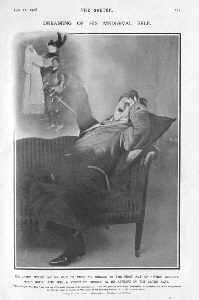 |
||||||||||||||||||||||||||||||||||||
|
Black and White (15 February, 1908) “WHEN KNIGHTS WERE BOLD” Mr. James Welch continues to ddelight playgoers with Charles Marlowe’s amusing travesty of the “good old times.” “When Knights were Bold” now claims the longest run in London and in the words of the celebrated advertisement of “Charley’s Aunt” may be “still running” a year hence. ___
The Fort Wayne Journal-Gazette (Indiana) (8 March, 1908 - p.12) |
||||||||||||||||||||||||||||||||||||
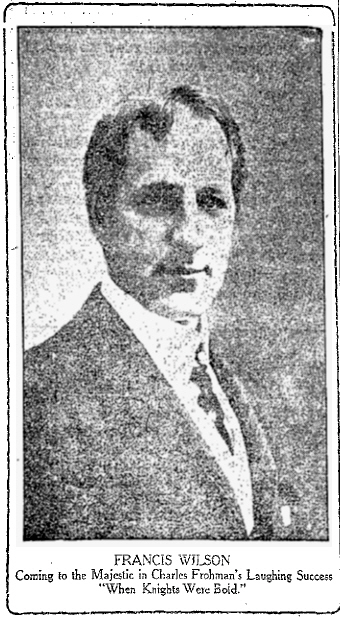 |
||||||||||||||||||||||||||||||||||||
|
FRANCIS WILSON, “WHEN Mounted in picturesque style and admirably played by Francis Wilson, the popular comedian, and a very strong company, amusement seekers have much to look forward to in the coming engagement of Mr. Wilson in Charles Marlowe’s farce, “When Knights Were Bold,” which he is presenting the present season under the direction of Charles Frohman. The author is said to have been most happy in his conception of this laughing play, for it has proved the greatest mirth provoking success of the present year, and Mr. Wilson presented it for five months earlier in the season on Broadway, New York. The numerous humorous complications brought about by taking the central figure, an absolutely modern young man, a trifle back over 700 years, the days of his ancestors, offer the comedian rare opportunity for fun making, of which he takes the utmost advantage. A company of forty players support Mr. Wilson in this play at the Majestic March 17. |
||||||||||||||||||||||||||||||||||||
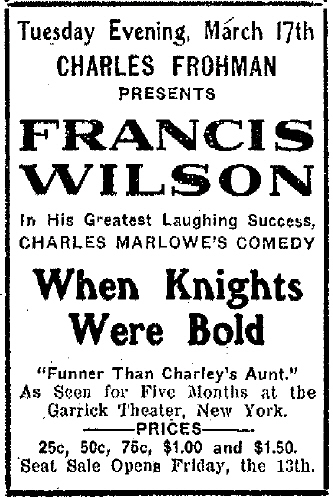 |
||||||||||||||||||||||||||||||||||||
|
[From an advert for the Majestic Theatre in The Fort Wayne Daily News (11 March, 1908).]
The Illustrated Sporting and Dramatic News (14 March, 1908 - p.19) |
||||||||||||||||||||||||||||||||||||
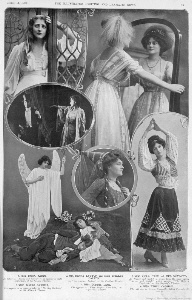 |
||||||||||||||||||||||||||||||||||||
|
The Daily Telegraph (19 March, 1908 - p.13) WYNDHAM’S THEATRE. The entertainment at Wyndham’s certainly loses nothing in respect of gaiety by the latest addition to it. “The Changeling,” produced last night in front of “When Knights Were Bold,” is an excellent piece of fooling. The fact that it bears the name of Mr. W. W. Jacobs, who has been assisted by Mr. H. C. Sargent in the congenial task of turning one of his own short stories to stage account, is alone a sufficient guarantee for this. The original tale appeared some two years ago in the “Strand Magazine,” and doubtless its purport is still remembered by most of Mr. Jacobs’s admirers. It tells of the trick devised by the ready-witted Ted Stokes to deceive the indignant spouse of his chum, George Henshaw, into the belief that, despite the evidence of her own eyes, it was not her volatile husband whom she had seen vigorously flirting with another woman on the top of a passing omnibus. To effect this purpose it is arranged by the conspirators that Henshaw shall be disguised as his own “double,” a certain Alfred Bell, supposed to hail from Scotland, and in that character be presented to Mrs. Henshaw. Unfortunately, the plot is discovered by the worthy lady, who proceeds to turn the tables upon the scheming couple in the most amusing fashion. In this instance an unusually quaint idea is developed by means of really witty dialogue, which serves to keep the listener on the broad grin almost from start to finish. We say “almost,” for, as it happens, the fun is towards the end drawn out to, perhaps, rather too fine a point. Luckily, the dénouement is of so diverting a nature as to bring the curtain down on a peal of laughter. Excellent acting contributed to the success of the trifle. Of the ingenious Ted Stokes, Mr. George F. Tully, gave an irresistible study, full of the broadest humour, and touched with a fine sense of observation. Altogether admirable, too, were Mr. H. J. Manning as Henshaw and Miss Helen Palgrave as his resourceful wife. What with the new first piece and “When Knights Were Bold,” the present programme at Wyndham’s provides a rich feast of merriment from first to last. ___
Programme from the Mason Opera House, Los Angeles, for When Knights Were Bold, starring Francis Wilson, commencing Monday, May 4th, 1908: |
||||||||||||||||||||||||||||||||||||
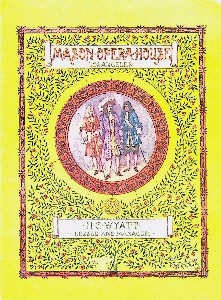 |
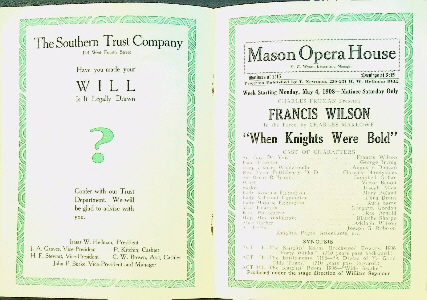 |
|||||||||||||||||||||||||||||||||||
|
Lloyd’s Weekly News (31 May, 1908 - p.10) “Lady Frederick” reaches its 250th performance on Wednesday, June 3, and, as a memento of the occasion, a souvenir, consisting of a signed photograph of Miss Ethel Irving from the original painting by F. Howard Michael, will be presented to each member of the audience at the Criterion. There will also be produced on the same evening a new one- act play, entitled, “A Lucky Spill,” in which Miss Elaine Inescort will appear. On Thursday Mr. James Welch will give the 500th representation of the screaming farce, “When Knights were Bold,” at Wyndham’s. The last representation of “Toddles” will be given at the Playhouse on Friday, and Mr. Cyril Maude hopes to be able to reopen his theatre six days later with the new naval comedy, “The Flag Lieutenant,” the rehearsals of which have been in full swing during the past fortnight. ___
The Otago Witness (New Zealand) (24 June,1908 - p.76) The new play, “When Knights Were Bold,” which Mr Frank Thornton stages at His Majesty’s Theatre on Friday, the 26th inst., is considered one of the greatest successes of modern times. It enjoys a run of over 600 nights (consecutively) in London, and shows no sign of waning. It ranks amongst the humorous absurdities which the theatre-going public love so well, as from the moment of curtain rise to final fall its humour never once falters. It is a dream play, full of fun and merriment, and the Australian season has been very successful. Mr Thornton brings with him an entirely new company of English artists, and during his five nights’ season in Dunedin produces “When Knights Were Bold” for Friday, Saturday, and Monday. On Tuesday, “Facing the Music”; and Wednesday, when he gives his farewell performance in Dunedin, “The Private Secretary,” appearing in his original character of the Rev. Mr Spalding, which made his name world- famous. ___
The Otago Witness (New Zealand) (1 July,1908 - p.69) HIS MAJESTY’S THEATRE. “WHEN KNIGHTS WERE BOLD.” Good comedy is always welcome, and not least so when it means the reappearance on the local stage of so popular an actor as Mr Frank Thornton, whom recollection associates for playgoers with many a hearty laugh in many a good production in the past. The new comedy introduced to Dunedin by Mr Thornton and his company on June 26 at His Majesty’s Theatre was “When Knights Were Bold,” by Charles Marlow, of which report had spoken in terms such as to make its advent anticipated with interest. Anticipation has no cause to be disappointed. The comedy is distinctly a good one. It possesses in the first instance the invaluable advantage of being based on a happy and novel idea, and apart from that it is well written and is really humorous. The dialogue is something better than the undiluted inanities too often holding undisturbed possession of modern comedy; and the situations, while farcical enough in character at times to satisfy even a bitter opponent of comic subtlety, do not wantonly transform the ridiculous into pure burlesque. The motif of the comedy is obviously one rich in humorous suggestions. Everyone knows that the so-called good old times must have really been very bad old times. In “When Knights Were Bold” the hero is Sir Guy de Vere, a rather simple-minded and very modern young man who possesses a castle, and bears with a somewhat bad grace the burden of being the representative of a great name and of the knowledge that he has to sustain the reputation of numerous great ancestors, of whom his friends, shocked at his lack of dignity, are constantly reminding him. In the first act the audience is introduced to a little house party at Beechwood Towers, the ancestral home of Sir Guy, and to a pretty little comedy the gist of which consists in the fact that Sir Guy and his guest Sir Brian Balymote are both suitors for the hand of the fair Lady Rowena Eggington, and in the fact that Sir Guy is getting all the worst of the luck, inasmuch as the Lady Rowena, essentially a haughty and romantic damsel, is favourably impressed with the valiant talk of Sir Brian, who claims to be descended directly from the kings of Ireland, and satisfies her idea as to the behaviour of one who has ancestors to live up to. As the curtain falls on the first act Sir Guy can be heard relapsing into a very bad dream; and the second act, the most broadly amusing in the comedy, carries the scene back some seven hundred years to the days of the great Richard Cœur de Lion, and transforms Sir Guy, to his own unspeakable amazement, into the most warlike and celebrated of his own great ancestors—albeit still clad in incongruous modern garb. By a happy inspiration all the characters introduced in the first act likewise go back to a previous incarnation, the result being extremely interesting and ludicrous. As his own great forefather Sir Guy does doughty deeds upon the battlements of his ancestral keep, and in particular meets a prehistoric Sir Brian Ballymote in mortal combat to see to whom shall fall the prize of a prehistoric Lady Rowena. Needless to say, Sir Guy, with the advantage of unforgotten modern experience, is victorious after a duel between mail-clad warriors of quite irresistible drollery. In the last act an awakened Sir Guy, feigning to be in a frenzy, makes the “good old times” the burden of such a to-do that all are glad to hear the last of them, and, what is more important, he contrives to make Sir Brian, who is an adventurer, cut a far from heroic figure, with the result that the Lady Rowena exercises the feminine privilege of changing her mind. Mr Thornton has the support of a strong company. As Sir Guy de Vere, Mr Thornton has himself a part giving him admirable scope for the exercise of his abilities as a comedian, and his impersonation was throughout to a degree amusing, the humour not being, however, unduly forced. Particularly effective was Mr Thornton in the last act, where Sir Guy, to the consternation of all around him, carries on in the manner and language of a twelfth century baron, with a ludicrous assumption of out-of-place dignity. The other parts in the cast were well sustained, without exception. Miss Belle Donaldson impersonated the Lady Rowena effectively, and has an excellent stage presence. Mr Douglas Hamilton, as Isaac Isaacson, made quite the most of the part of an unscrupulous financier, and Mr Keppel Stephenson was imposing and natural in the somewhat aggressive role of Sir Brian. Mr Charles Stone imparted some touches of real humour into his presentment of the part of the Hon. Charles Widdicombe, who has a penchant for conundrums, having in an earlier incarnation been a jester, and Mr Temple Powell, as Wittle, and Mr Charles Windermere, as Barker, impersonated respectively the youthful and venerable servitors of Sir Guy in a thoroughly capable fashion. Miss Clare Manifield, as Miss Isaacson, and Miss Harriet Trench, as the Hon. Mrs Waldegrave, made the most of parts giving limited opportunities, and the other lady members of the company met the demands made upon them most adequately. “When Knights were Bold” affords opportunity for some effective scenic display, and the lavishness of the staging is not one of the least of its merits. A scene of particularly brilliant colouring is presented in the second act, with its depictions of old-time costumes. As to the reception of the comedy, it was demonstratively appreciative, the audience finding the appeal made to its sense of the humorous and ludicrous quite irresistible. As a curtain-raiser, a rather taking comedietta entitled “Clause Six” was produced, the parts in which were capably taken by Mr Temple Powell and Miss Claire Manifield. A good orchestra contributes the necessary music. ___
The Evening Post (Wellington, New Zealand) (11 July, 1908 - p.11) Mr. Frank Thornton will commence his farewell season in Wellington next Thursday, under the direction of Mr. Edwin Geach in “When Knights Were Bold,” which is, notwithstanding its title, a modern play, with an exceptionally clever plot and an admirably crisp dialogue, and is interpreted by a very capable company of London artists whom Mr. Thornton brought from England to support him. Commenting on the play, a Melbourne contemporary says: “Mr. Thornton as Sir Guy de Vere practically holds the stage from curtain to fall, and the undoubted success of “When Knights Were Bold” must be attributed to his clever impersonation. Voice, facial expression, droll mannerism, and nimble movement all aid effectively in emphasising the points of his clever work. He is so thoroughly good all through that his previous reputation was quite unnecessary as an aid to the genuine success undeniably attained.” The main attraction is preceded by a charming one-act comedietta by Charles Windermere, entitled “Clause Six.” ___
The Mercury (11 July, 1908 - p.4) I observe that Mr. James Welch advertises the run of “When Knights were Bold” at Wyndham’s as “the longest run this century.” This is an impressive announcement, at first sight, but not quite so impressive when one reflects that the century is not yet very far advanced. “When Knights were Bold” is an excellent play of its kind, and it has scored a remarkable success, upon which Mr. Welch is to be congratulated, but I venture to predict that as regards “longest run,” it will not approach that of two plays in the last century— “Our Boys” and “Charley’s Aunt.” ___
The Evening Post (Wellington, New Zealand) (17 July, 1908 - p.2) ENTERTAINMENTS. OPERA HOUSE. “WHEN KNIGHTS WERE BOLD.” Laughter in odd individual bursts, laughter in chorus, laughter in all sorts and sizes, rang out at the Opera House last night. “When Knights Were Bold,” staged by the Thornton Comedy Company, proved to be a play which had little respect for the people’s ribs; it tickled them all the time. It is a plot which recalls Mark Twain’s “Yankee at the Court of King Arthur,” and other conceits which have whisked moderns, with their modern ideas and paraphernalia, back to ancient times, but the treatment is new. The action opens in the Knights’ Room, Beechwood Towers, soon after Sir Guy de Vere has inherited the ancient castle and estates. He had noble ancestors “in days of old, when knights were bold,” and the war clothing was very stiff and chilly in winter time, but he himself is very modern, fond of modern whisky and soda and modern slang, to the great disgust of his romantic cousin, the Lady Rowena, who dotes upon the brave days of old. She is an ardent yearner for the snows of yesterday, and cannot understand why Guy prefers the whisky of to-day. Incidentally he has a cold in the head, which helps the whisky and the slang to put spots on the halo of romance which Rowena desires to throw upon the castle. Incidentally, a wealthy Jew, Isaacson, desires Guy (who loves Rowena) to marry the Jew’s daughter, and invokes the aid of an Irishman, Sir Bryan Ballymote, to court Rowena, and talk “days of old” to her ceaselessly. Driven to the flask by Rowena’s merciless whip of other days, Guy has a weird dream. He is transported to the year 1196, and sees all his friends and servants dressed in the style of the Richard I. period, and talking the language of that remote day as well as the author, Mr. Charles Marlowe, will permit them. As he stands on the battlements and lights his last cigarette he severely frightens his retainers, and has a few very droll adventures. When he awakens he has a brilliant idea to continue the old days business in order to give Rowena and others a more than sufficient feast of high romance. Armed with a dressing-gown and a sword longer than himself he makes a pother which considerably upsets the household, incidentally sets the seal of cowardice upon Sir Bryan, and wins the girl, comfortably. She confesses that her interest in the dead and buried centuries is no more. There are various little side lines in the play all nicely knotted up with the leading string. The dialogue is bright; the comicalities come along freely and easily; one can laugh unashamedly. ___
The New Zealand Free Lance (25 July, 1908 - p.14) The Frank Thornton Company have been doing exceptionally fine work during the run of their farewell visit. The company opened with Charles Marlowe’s recent London success, “When Knights Were Bold.” It marked the first appearance in Wellington of Mr. Frank Thornton’s new English Comedy Company. “When Knights Were Bold” is a distinctly humorous and ludicrous piece. Much of the action of the play represents the incidents of a dream, in which to the somnolent one the clock is put back a trifle of 710 years, and he finds himself taking an active part in events which are supposed to have occurred during the stirring times of Richard Coeur de Lion. ___
Black and White (25 July, 1908 - p.106) WITH a view to enabling the French and German visitors to Wyndham’s Theatre to follow more closely the story of that extraordinarily successful farce, When Knights Were Bold, the management have had inserted in the programmes a synopsis of the play in both the German and French languages. This innovation should prove popular with the large number of foreign visitors now in the metropolis. ___
The Daily Telegraph (20 October, 1908 - p.9) KENNINGTON THEATRE. Those who desire a delightful evening’s fun should go and see Mr. James Welch and his company act “When Knights Were Bold,” at the Kennington Theatre. If they have already seen this capital little play, as politicians say, in another place, they will doubtless be willing to witness it again in such an accessible and convenient locality, and if they have not then there is all the more treat in store for them. The story, as all playgoers know by this time, is based on the yearning of a young man lately come into a fortune and a baronial hall for a return to the good old time when gallant knights rode about rescuing beauty in distress, and life, at all events as represented by the ballad makers, was much more picturesque than it is at present. The young baron dozes amongst his carved oak and suits of armour, and wakes to find himself under the circumstances he imagined. He, however, is not altered in himself, and brings into a circle of knights in armour and quaintly-garbed ladies the needs and ideas of twentieth-century existence. It need not be said what fun Mr. James Welch, who takes the principal part of Sir Guy de Vere, extracts from this situation. He is ably helped by his company, Mr. George Desmond as the Hon. Charles Widdicombe, Mr. Guy Lane as the Rev. Peter Pottlebury, and Miss Audrey Ford as Lady Rowena Eggington all going merry as a marriage bell. The present piece is to continue at the Kennington for six nights only, a fact of which dwellers in the Southern suburbs should make particular note. It is to be followed by “The Thief,” and later on, namely on Nov. 9, by Miss Ellaline Terriss, Mr. Seymour Hicks, and their company in “The Gay Gordons,” also for six days only. On the 27th of the present month a grand matinée concert, in aid of the Mayor of Southwark’s Underfed School Children’s Fund, is to be held at the theatre, by the kindness of Mr. Robert Arthur. ___
|
||||||||||||||||||||||||||||||||||||
 |
||||||||||||||||||||||||||||||||||||
|
On Saturday, the Vasa Theatre will premiere "Bland balde riddersman", a farce in 3 acts by Charles Marlowe, translated from the English by Hugo Vallentin. p.4 |
||||||||||||||||||||||||||||||||||||
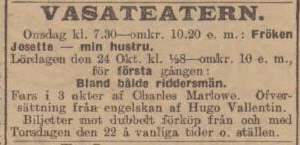 |
||||||||||||||||||||||||||||||||||||
|
Svenska Dagbladet (8 November, 1908 - p.11) Behind the scenes at Vasa Theatre[Sorry, the rest’s in Swedish, although there is a photo of “Miss Hedman in her dressing room” and a couple of drawings of the production.] |
||||||||||||||||||||||||||||||||||||
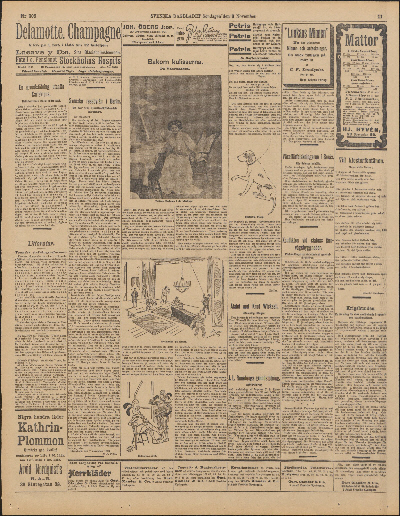 |
||||||||||||||||||||||||||||||||||||
|
Photos of some of the cast: Olof Winnerstrand as Sir Guy de Vere in Bland bålde riddersmän at Vasateatern, Stockholm 1908. |
||||||||||||||||||||||||||||||||||||
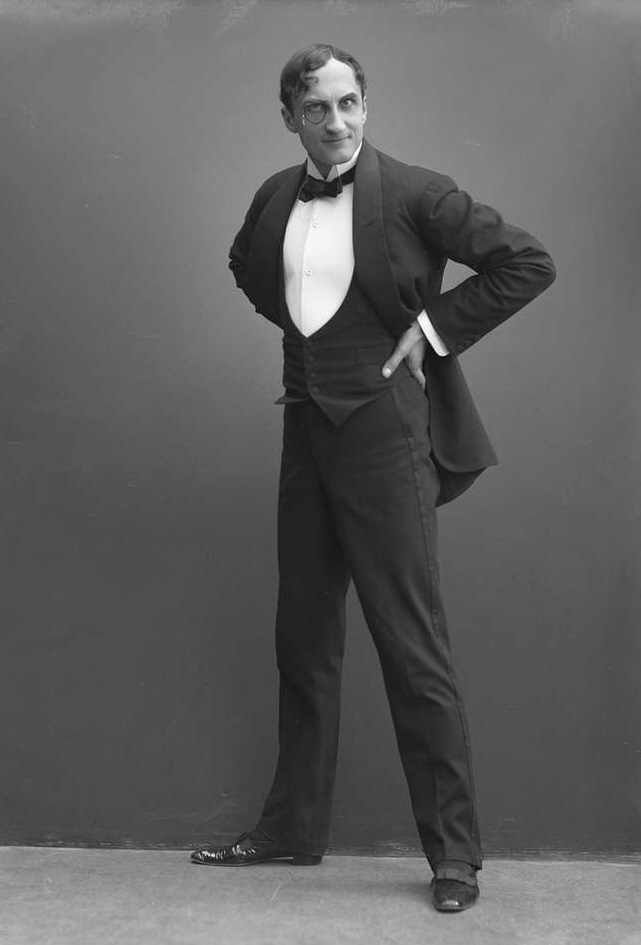 |
||||||||||||||||||||||||||||||||||||
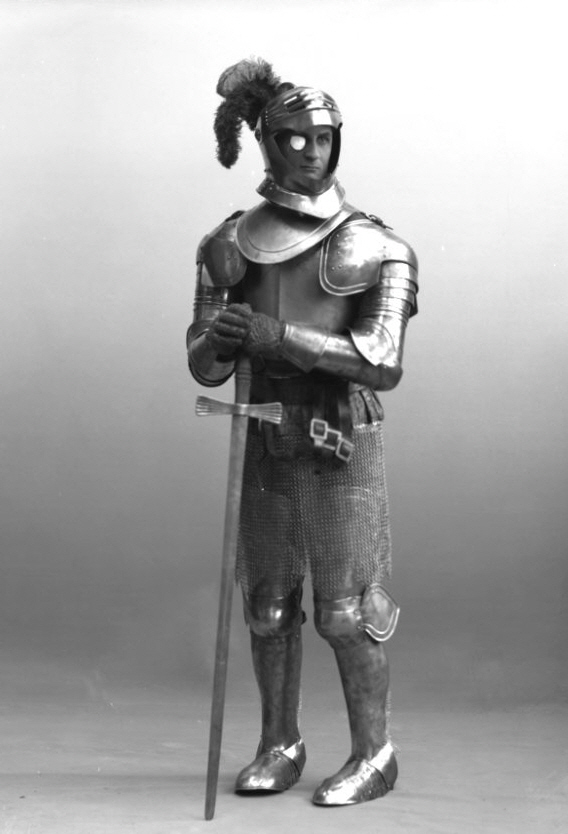 |
||||||||||||||||||||||||||||||||||||
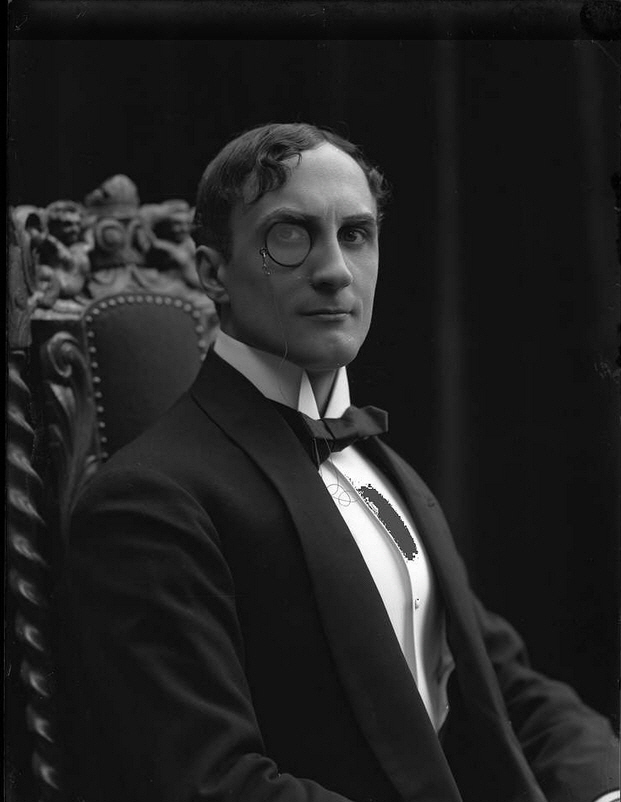 |
||||||||||||||||||||||||||||||||||||
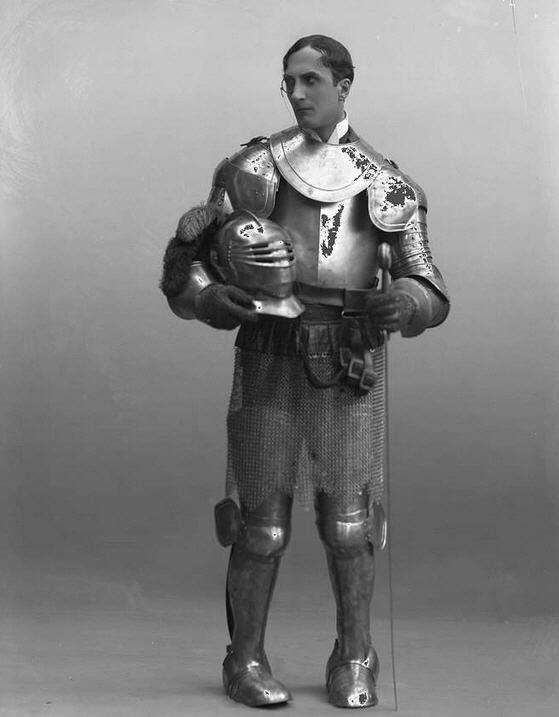 |
||||||||||||||||||||||||||||||||||||
|
Victor Lundberg as Reverend Peter Pottleberry. |
||||||||||||||||||||||||||||||||||||
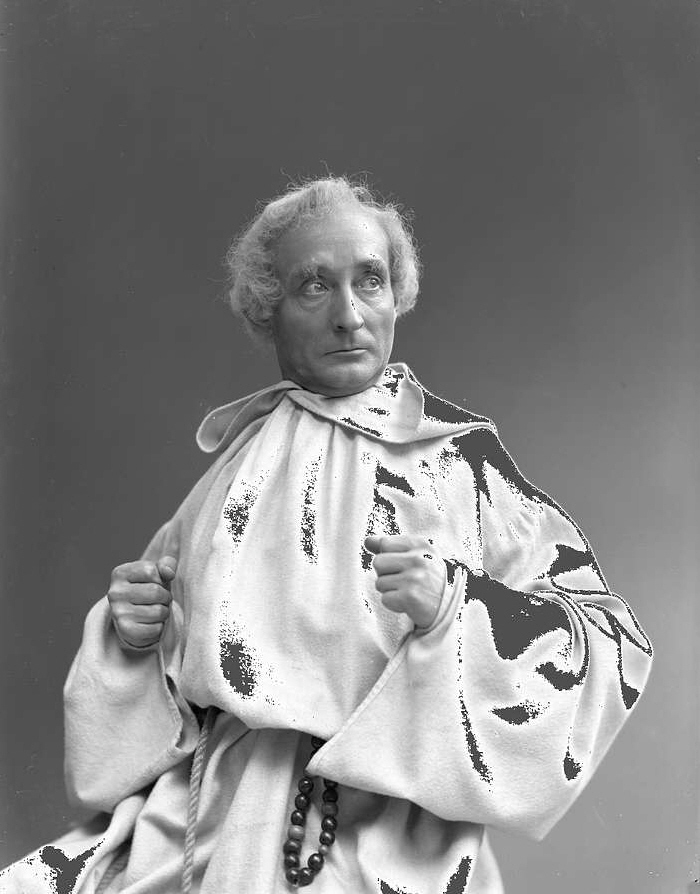 |
||||||||||||||||||||||||||||||||||||
|
Gina Barcklind in Bland bålde riddersmän, Vasateatern 1908 |
||||||||||||||||||||||||||||||||||||
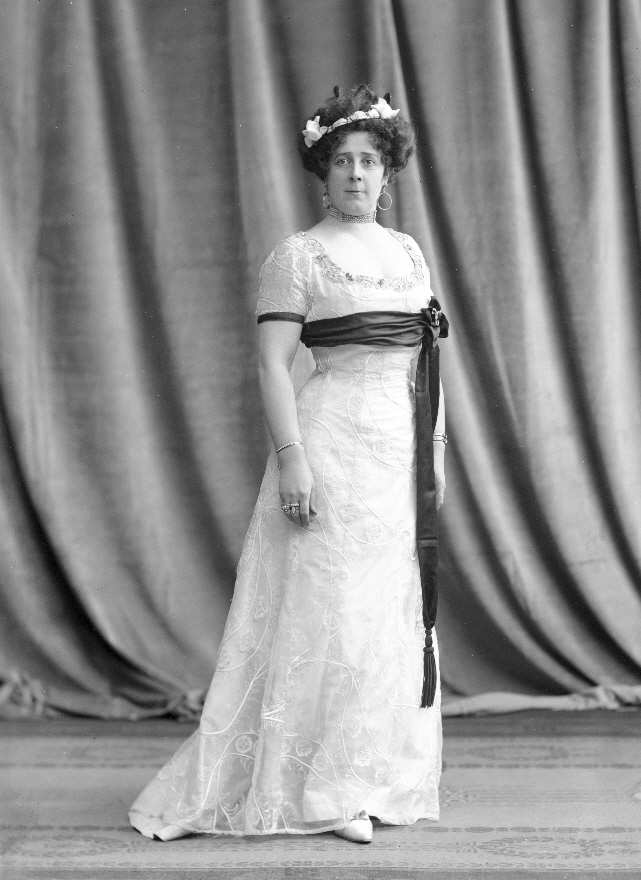 |
||||||||||||||||||||||||||||||||||||
|
I’ve not found any reviews of this production (in English or Swedish) but I did come across this in The Great Theatre in Gothenburg 1893 - 1929: A Few Pages From Its History by Axel Fromell (Gothenburg: A Lindgren & Sons Book Printing 1929) which is available here. “Ranft had two tours here. One with Peter Fjelstrup as a guest, played the Danish play ‘A City Home’ that had been performed here before, while the other from the Vasateatern gave ‘Bland bålde riddersmän’ with Olof Winnerstrand as Sir Guy de Vere and Miss Josette — my wife, where Frida Winnerstrand "radiated". The Vasateatern is still in existence and for a time Krister Henriksson, the best Wallander ever, was the co-owner and Theatre Director. |
||||||||||||||||||||||||||||||||||||
 |
|
Black and White (12 December, 1908 - p.800) |
|||||
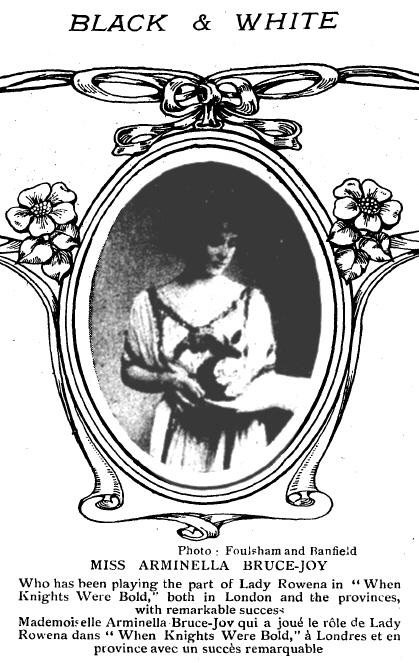 |
|||||
|
The Galveston Daily News (Texas) (3 February, 1909 - p.5) AMUSEMENTS Francis Wilson—“When Knights Were Bold.” Francis Wilson has for years—just how many would perhaps be unkind to enumerate—been recognized as one of the foremost laugh producers on the American stage. By dint of hard work in his vehicle this year, “When Knights Were Bold,” he continues, with the support of a good company, to maintain that position. While there are few situations bringing forth “roars of laughter,” the piece as handled by Mr. Wilson and his able company abounds in round after round of good, hearty laughter. ___
The Washington Herald (18 April, 1909 - p.4) “When Knights Were Bold.” Fitting comedians with stellar vehicles is about as difficult a proposition as confronts the theatrical manager of to-day. Therefore, Charles Frohman feels that more than ordinary success crowned his efforts when he selected for Francis Wilson’s use the farce, which was already in its first year of success in London, “When Knights Were Bold.” The author of this amusing satire is Charles Marlow (Harriet Jay), and the author’s theme is the pride of ancestry indulged in by so many people at the present time. While the scenes of “When Knights Were Bold” are all English, the locale might be anywhere, for the satire would fit one locality as well as another. And delightfully sharp satire it is said to be, too, the little shafts being perfectly aimed and deftly shot. As a stellar vehicle for the popular comedian, it is said on every hand that it is the best play he has had in many years, in fact, not since he gave up the comic opera stage, has he found a part so thoroughly suited to his delightful personality or one which offers him so many opportunities. Mr. Wilson is on the stage practically all of the time, and when he is there the fun never for a single moment ceases. ___
The Washington Herald (20 April, 1909 - p.11) THE NATIONAL. “When Knights Were Bold.” “When Knights Were Bold,” Francis Wilson’s latest play, is vastly different from the class of vehicle with which his name is usually associated. It might, without undue stretch of the term, be called a satirical comedy; at least it cannot be dismissed with the statement that it is a mere frame upon which to hang horseplay or eccentric comedy. It has a distinct object in view, which is to show that ancestor worship can be carried so far as to make it extremely ridiculous. Of course, the peculiar qualities of Mr. Wilson predominate in the comedy, but he is at his very best, and in many episodes shows himself to be a straight comedian of skill, who does not have to depend entirely on horseplay or absurdity of costume. ___
The Sketch (23 June, 1909 - p.18) |
|||||
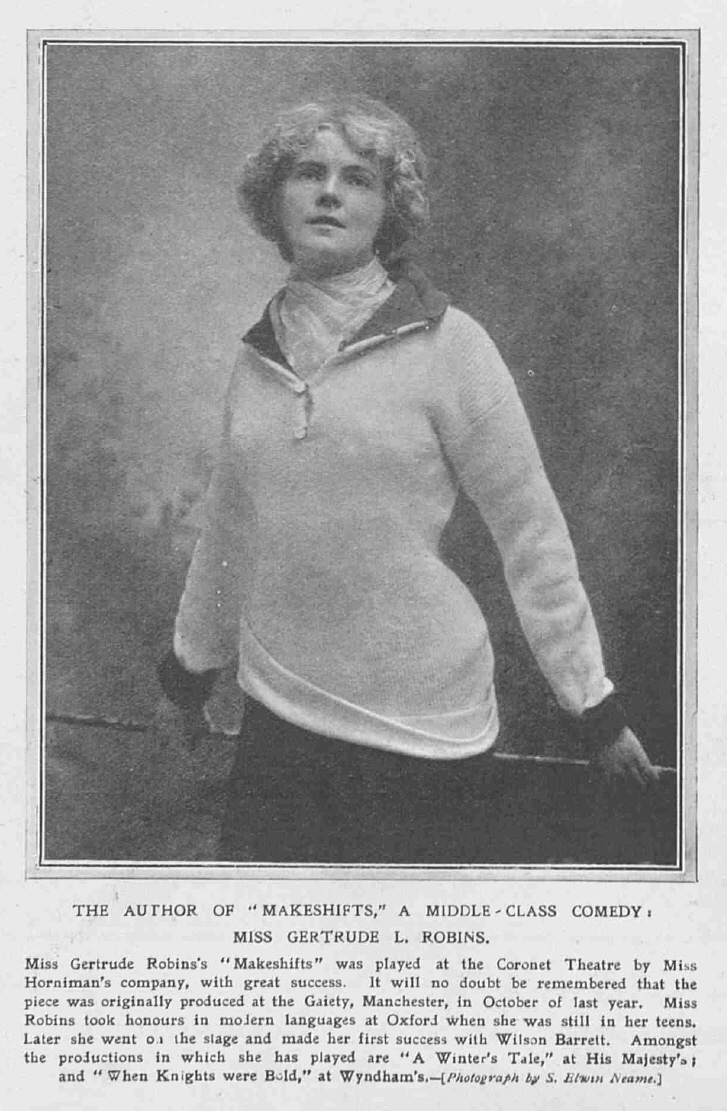 |
|
4. When Knights Were Bold - Reviews, etc. (1910-1924) or back to When Knights Were Bold main menu
|
|
|
|
|
|
|